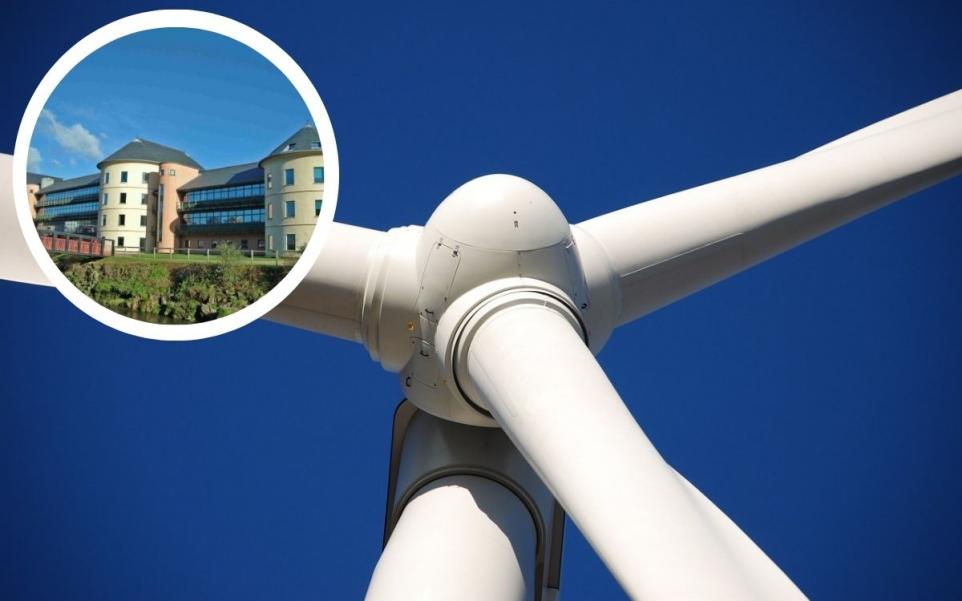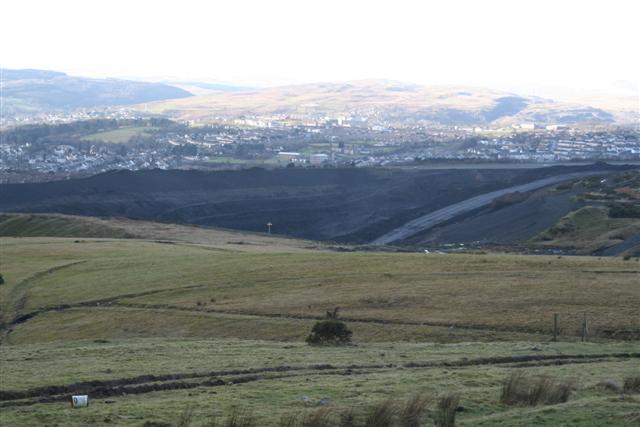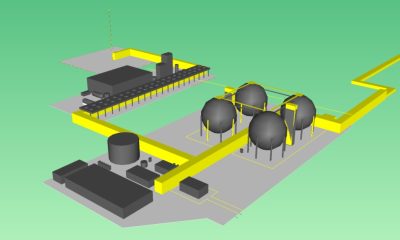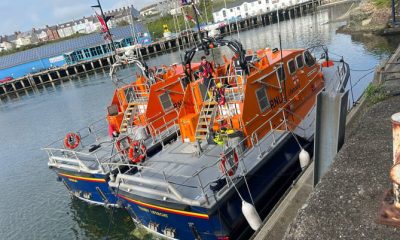Climate
Marine Energy Wales and RenewableUK Cymru unite for Wales’ clean energy future

Marine Energy Wales and RenewableUK Cymru have officially joined forces, signing a Memorandum of Understanding (MoU) at the culmination of the two-day Future Energy Wales conference held on November 6-7. This strategic collaboration aims to propel the transition to renewable energy and marks a pivotal moment for the marine energy sector in the country.
Marine Energy Wales, deeply rooted in the marine renewable energy sector, stands as the voice for the tidal, wave, and floating offshore wind (FLOW) industries. On the other hand, RenewableUK Cymru focuses on Welsh onshore wind, offshore fixed-bottom installations, and the burgeoning floating offshore wind sector in the Celtic Sea region.
Both organisations, driven by a shared commitment to support the renewable energy industry in Wales, recognise the economic and environmental opportunities for local communities. The Memorandum of Understanding underscores their dedication to collaborative efforts, particularly within the FLOW sector, to achieve maximum benefits for both the industry and the nation.
The pact outlines several key objectives that include building a compelling case for the deployment of renewables in Wales and the broader UK. Additionally, both parties pledge to collectively influence stakeholders in the UK and Welsh Government to eliminate or mitigate barriers hindering deployment. The focus extends to maximising the potential opportunities of offshore wind, with special emphasis on floating offshore wind in the Celtic Sea.
The agreement also sets the stage for establishing a robust and innovative supply chain, essential to supporting renewable energy activities. Collaborative events aimed at raising Wales’ profile and attracting investment will be organised, providing platforms for business development, political engagement, and networking.
Noteworthy is the role of Marine Energy Wales in the Celtic Sea Developer Alliance, initiated in 2019 alongside partners in Ireland and the South West. The alliance, currently comprising 25 developers, strives to ensure that the Celtic Sea’s potential is maximised at a scale and pace crucial for achieving Net Zero. Furthermore, its mission is to position Wales as a global leader in the marine energy sector.
Tom Hill, Programme Manager at Marine Energy Wales, highlighted the significance of this partnership, stating, “Collaboration is crucial if we are to realise Wales’ renewable opportunity at the scale and pace required for Net Zero.”
Jess Hooper, Director at RenewableUK Cymru, echoed this sentiment, expressing optimism about the collaboration’s potential impact on Wales. “Power generation from a diverse renewable energy mix is a win-win for Wales, benefitting all geographical regions in industrial, rural and coastal communities,” she affirmed.
As the two organisations embark on this collaborative journey, their unified front signals a resolute commitment to propel Wales towards a sustainable, net-zero future through the harnessing of marine energy resources.
Climate
£1m turbine application to be decided by all councillors at County Hall

A TWICE-BACKED £1m scheme for a “20-storey-high” wind turbine at a Pembrokeshire mansion will have to be decided by all councillors.
Mr and Mrs Glen Peters of Western Solar Ltd are seeking permission for a single turbine on land near the Grade II-listed Rhosygilwen Mansion, which includes an arts and functions building known as Neuaddydderwen.
Members of the April meeting of Pembrokeshire County Council’s planning committee were recommended to refuse the scheme, despite backing it at their March meeting.
This backing meant the application returned to the April meeting for ratification after a ‘cooling off’ period; the application having been deferred at the January meeting pending a site visit.
It was initially recommended for refusal in January for several reasons, including potential harm to the setting of the Grade-II-listed house and grounds, and fears of threats to the safe operation of West Wales Airport at Aberporth in neighbouring Ceredigion, some 9.5 kilometres away.
The last concern was later withdrawn.
In papers ahead of the April meeting, officers, again recommending refusal, have said the scheme “would not protect or enhance the setting [of Rhosygilwen] but rather would result in significant harm to this interest of acknowledged importance”.
They have also warned any backing of the scheme against policy recommendations could set a precedent for similar developments.
Climate
‘Big gap’ in funding to restore opencast mines

A FUNDING gap of tens of millions is thwarting efforts to restore opencast mines – and public authorities in Wales must clamp down on corporate greed, a committee heard.
The Senedd’s climate change committee began taking evidence for an inquiry on restoration of opencast mines amid concerns about Ffos y Fran in Merthyr Tydfil.
Carl Banton, operations director at the Coal Authority, said the public body tries to broker the best restoration possible but the primary problem is a lack of funding.
He told the committee that £50m is available for restoration work at Ffos y Fran, which closed in November, but it will cost anywhere from £75m to £125m – “a big, big gap in funding”.
Mr Banton said East Pit and Margam regeneration plans suffered from a similar shortfall.
“One of the big issues now is the amount of water that is in those voids,” he said, warning that pumping the water out is a “huge undertaking” potentially costing tens of millions itself.
Mr Banton explained that councils are the primary authority for regulation of surface mines through planning and the Coal Authority has a role in terms of licensing mining operations.
Raising 2016 best practice guidance on restoring surface coal mines, Mr Banton said: “The idea of this was to try to prevent the situation we are currently in.”
Mr Banton warned that the amounts held by councils in escrow in case a company goes into insolvency are “nowhere near sufficient” for restoration plans.
The operations director said the Coal Authority offered guidance to Merthyr Tydfil council around escrow in 2016 “but they chose not to go down that route”.
Mark Drakeford suggested the UK Government’s remit for the Coal Authority – to maximise the extraction of coal – is in stark conflict with Wales’ policy of minimising use of fossil fuels.
Mr Banton told the former First Minister a planned review of the remit has not taken place.
On Ffos y Fran, he said the Coal Authority wrote to the Welsh Government in October to raise the risks in terms of public safety and the need to act sooner rather than later.
Mr Drakeford raised concerns about an inspection which found the company was mining beyond the Ffos y Fran site boundary without planning permission.
Mr Banton said the Coal Authority reinspected in August, finding the company was still mining outside the permitted area, and began enforcement action in September.
Delyth Jewell, for Plaid Cymru, raised concerns about Merthyr Tydfil council’s suggestion that the void filled with contaminated water could form part of a restored site.
Mr Banton said a hydrogeological assessment will be required to ensure the water is safe.
Daniel Therkelsen, from the Coal Action Network, attributed a lack of restoration in Wales to legislative weakness and corporate greed.
The campaigner said Celtic Energy’s sites have been left in a dire state, with a judge finding the actions of the company were reprehensible but not illegal.
Mr Therkelsen said the Fros y Fran site operator, Merthyr (South Wales) Limited, has paid out nearly £50m in dividends and shares since 2016.
Marcus Bailie, an Extinction Rebellion Cymru activist, similarly raised alarm about private profit coming at the expense of public and planetary good.
Pointing to East Pit and Margam as examples of poorly restored sites, Mr Therkelsen said people nearby continue to call for restoration to “some sort of semblance of what it was”.
Friends of the Earth Cymru director Haf Elgar said campaigners have been raising concerns about Ffos y Fran for years as she urged the council and Welsh Government to intervene.
She said: “It’s been quite difficult to get information out of the local authority – whether that’s about ensuring local communities are consulted or basic planning documents.”
Mr Therkelsen said responses have been protracted, accusing the council of “blocking” public scrutiny on one hand while holding weekly meetings with the operator on the other.
He warned that the 14 to 16 months of illegal mining at Ffos y Fran saw around 600,000 tonnes of coal extracted, leading to an estimated 428 climate-related deaths.
He said: “Nothing happens to them – there are no consequences. Not one penny of the company’s profits have been touched despite mining illegally for over a year.”
David Kilner, campaign coordinator at Climate Cymru, said restoration plans for Fros-y-fran will likely be deeply insufficient considering the funding shortfall.
Ms Elgar raised concerns about the risk of plans for Bedwas tip “opening the door” to another industry of extracting coal in exchange for a promise of restoration.
Llyr Gruffydd, who chairs the committee, criticised Merthyr Tydfil council which refused to give in-person evidence on April 24, submitting two pages of written evidence instead.
Merthyr (South Wales) Ltd has been invited to give evidence to the committee on May 9.
Climate
NRW to reduce mowing in May to help pollinators

NATURAL Resources Wales (NRW) will reduce mowing as much as possible on the land in its care during May to help tackle the nature emergency and in support of Plantlife’s ‘No Mow May’ campaign.
The scale and rate of biodiversity loss across Wales is accelerating. Every third mouthful of food we eat has been created by pollination, and without pollinators our food supply would collapse.
Half of the UK’s 27 bumblebee species are in decline, and of the 43 species of butterfly seen in Wales, 10 are in severe decline and 17 are declining.
There are several reasons for the decline in pollinators, such as climate change, pollution and pesticides, and change in how land is managed.
Throughout the growing season, NRW cuts grass and vegetation in areas such as forests, nature reserves, river banks, flood defences and reservoir embankments.
Reducing mowing in May will help biodiversity by allowing spring plants to set seed and grow to provide nectar and pollen for pollinators, such as bees and butterflies.
NRW will reduce its mowing activities in May as much as possible, but essential grass cutting will continue in some areas across Wales.
There are several reasons for this, for example:
- to manage access to forests and nature reserves to make sure people are safe when they visit.
- to easily inspect flood defences and repair them if needed, helping to reduce flood risk to communities.
- for nature conservation, for example to manage an invasive species or to benefit species in a certain area by cutting the vegetation.
David Letellier, NRW’s Head of Operations South Wales Central, said: “We’re committed to tackling the climate and nature emergencies and helping nature and people thrive together.
“We will reduce our mowing activities in May as much as possible to support pollinators, but we want people to understand that we may carry out essential grass cutting to benefit certain communities or species.
“For example, we may continue mowing flood defences to make sure they are in good working order, or if mowing some sites in May would leave wildflowers to recover and bloom throughout the late summer to benefit certain pollinators.
“We need to act now to protect our pollinators. This is why we manage all of our sites to make them as pollinator friendly as possible and to provide food and shelter for other species.
“There are things we can all do to make it easier for pollinators to survive. These can be relatively simple, such as managing grass verges in a more sensitive way, or leaving wild areas around our offices, homes and public buildings.
“We can all help by making our gardens pollinator-friendly by not using pesticides, not mowing the lawn as often, and growing pollinator-friendly plants.”
-

 News6 days ago
News6 days agoPolice investigating after woman found dead on beach near Pennar
-

 News6 days ago
News6 days agoPolice discover body in search for Luke Stephenson, 19
-

 News6 days ago
News6 days agoCouncillors block Milford Haven boxing event – promoter to appeal
-

 News5 days ago
News5 days agoBeautiful, funny and lovely: Family pay tribute to Sian Batchelor
-

 Community1 day ago
Community1 day agoJoy as Willow rescued by coastguard after 12-day ordeal
-

 News7 days ago
News7 days agoSearch efforts continue for missing teenager Luke Stephenson
-

 Business2 days ago
Business2 days agoDragon LNG explores integration of LNG and CO2 liquefaction processes
-

 News4 days ago
News4 days agoBody recovered confirmed to be Luke Stephenson, say police



































